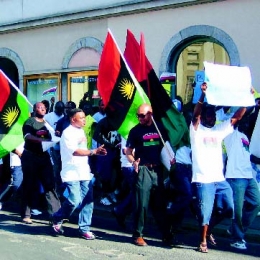Robert Carry: From the Home Front Many opposed to immigration in Ireland point to the fact that large numbers of people from places not suffering from conflict arrive here and claim asylum. Among the most commonly highlighted country in this regard is Nigeria.
 But while Nigeria may not be embroiled in any war of a conventional nature, it is struggling with bitter internal disputes that have led to a raft of human rights abuses. In this context, it is hardly surprising that people have been forced to flee.
But while Nigeria may not be embroiled in any war of a conventional nature, it is struggling with bitter internal disputes that have led to a raft of human rights abuses. In this context, it is hardly surprising that people have been forced to flee.
Nigeria, a land whose borders were drawn up during the colonial era, has long struggled to create a cohesive identity, and the ethnic and cultural differences within have frequently sparked conflict. The worst came in the late 1960s when the majority Biafran south-eastern provinces attempted to break away from the rest of Nigeria.
They declared themselves as the independent Republic of Biafra, they formed a government and military, printed money, issued state documents and even secured official recognition from a number of other states. The Nigerian central government responded by blockading the new state and practically starved its inhabitants into submission.
The brutal suppression of Biafran nationalism continued through the following decades. But when military rule came to an abrupt end in 1999 and elections were called, many felt that they would be given the breathing room to express their desire for autonomy. Indeed, a number of pro-democratic movements that had been stifled under the old regime started to emerge, and there were calls for a constitutional conference on national unity.
However, opponents and international observers accused the new president – former general Olusegun Obasanjo – of electoral fraud, saying the poll that brought him to office had been neither free nor fair. The human rights abuses continued, too, but now the die had been cast, and the minority groups that had began to organise around the time of the elections continued to meet, despite often ruthless suppression by the authorities.
The Movement for the Acutalisation of the Sovereign State of Biafra (Massob) was formed, and began to spread through Biafran communities across the country. This disturbed the government, which was bitterly opposed to both the concept of a Biafran state and any expression of a Biafran identity.
Despite the fact that the Massob movement was committed to exclusively peaceful means, the central government began rounding up members and holding them in detention. Things soon got worse, with hundreds of Massob supporters killed or ‘disappeared’. Many are on the run today, both inside Nigeria and abroad, with an unknown number still held under the government’s internment policy.
Some in Ireland have suggested that Nigerians seeking asylum should emigrate to the nearest place they can escape to. But they forget that if they are found in a neighbouring country, they will simply be handed back to the Nigerian authorities. Naturally, they are going to attempt to reach a country in which they will get a fair hearing and get a decent chance of having their rights protected.
There may not be a war blazing across Nigeria, but that does not mean people there do not have legitimate reasons for seeking refuge abroad. And while that is not to say that there is no such thing as a bogus asylum seeker, it does render blanket judgements on the veracity of asylum claims from a particular country pretty much redundant.
Robert Carry has worked as a journalist in Ireland, Thailand and Australia











